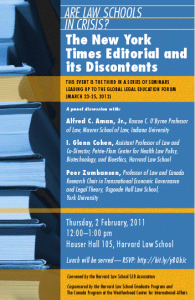ARE LAW SCHOOLS IN CRISIS?
Alfred C. Aman, Jr.

Seminar, February 2, 2012: Convened by: the Harvard Law School SJD Association
The New York Times’ call for reform comes during a time of unsteady economic recovery, rising tuition costs, ever-higher debt loads for students, and fewer legal jobs, especially high paying legal jobs. Many firms are restructuring themselves in ways likely to outlast the current recession. But does this mean law schools are in crisis? I believe the call for reform is a symptom of a crisis situated elsewhere – and that, viewing the patient from a broader perspective, the diagnosis of crisis in legal education may be misplaced.
In these brief remarks, I want to make the case that law schools are (and have been for some time now) in a transition driven by the transnationalization of law. In recent years, law school curricula have become more theoretical and more skills oriented, and this is as it should be. Thus, I see the present situation within law schools not as requiring a choice between theory and practice, but ever more creative ways of integrating theory and practice. We need theory to know what our practical priorities should be.
As preface, let us acknowledge that the world is in crisis – and it would be surprising if some aspects of that more general state of affairs did not affect law schools. I am referring to the crisis of neoliberalism – the limits of which are now evident in Europe, as well as in debates over federal expenditures here in the U.S. Is there anything in this situation that poses new challenges for law schools?
To this, the answer is surely yes. At a minimum, the lingering effects of the economic downturn affect law schools in three main areas. The first, and perhaps most obvious, is the cost of legal education itself. In modern times, law schools have always had to deal with the intricacies of managing the law school/university interface with regard to revenue flows and cost sharing. But now there are more intense pressures. I refer to the challenge of maintaining broad access to legal education through financial aid, as demand for aid goes up even as other needs press hard against tuition dollars, annual funds, and returns on endowment.
A second area of the downturn’s impact is the volume of business for law firms, and the demand for new legal talent. Current law school curriculum reformers, both inside and outside the academy, echo employers and their clients in calling for more skills and less theory. Law firm clients are savvy consumers, and some don’t want to pay for trainees. Law firms want graduates prepared for the practical demands of practice — prepared, as they say, to hit the ground running. Twenty years ago Judge Harry Edwards sounded a similar complaint when he focused on interdisciplinary approaches to law as a diversion from fundamentals. Chief Justice Roberts has echoed this view more recently. I could not agree less with that complaint. If law firms and law schools have different priorities, we should not assume this is a deficit on the law schools’ side. Law firms serve today’s clients. Law schools train lawyers, but we are also educating them to meet the knowledge demands of today’s dynamic legal scene and well into the future. And that brings me to a third area of impact from the current crisis:
The third area of change involves recent changes in law and society – particularly the emergence into prominence of that complex set of developments known as transnationalism. Law is no longer the monopoly (if it ever was) of states and their internal jurisdictions. Transnationalism is radically diverse: combining domestic and international institutions, as well as non-state entities – some of them (multinational corporations) as wealthy as most nations, others (vulnerable populations at the social margins) practically invisible. Markets and states are thoroughly mutually embedded; the very idea of “national interest” nowadays is inseparable from the state’s interest in maximizing the national position in transnational flows of capital, goods, people and ideas. Accordingly, transnational law is layered, dynamic, multi-centered, involving many purposes, and calling on many different kinds of analysis.
In this regard, the practical demands of the current legal scene are not what they were even ten years ago. It takes tremendous analytical agility to manage the multiple polycentricities and complex fusions of contemporary law that law students will face as soon as they begin their careers. Law students are coming to their professional degrees from undergraduate educations increasingly imbued with transnationalism – not only in the social sciences such as economics and political science, but also in the humanities (literature, history, cultural studies). In recent years, transnationalism has had significant impact on disciplinary borders and bridges, issues of identity and rights consciousness, and the very meaning of professionalism. The internationalization of law schools through exchanges and advanced degree programs is also here to stay. Suffice it to say that the transnationalization of law and legal education is an inescapable and irreversible development of the current scene.
While some of the impact of transnationalism may be in the realm of intangibles (for example, felt as a shift of consciousness rather than material conditions these developments are very real, and so are their demands on faculties and students. This is why I feel it is a mistake to pin these developments on law schools as their internal crisis. What we are experiencing is a pervasive conflict over mission, but this is not a conflict we can resolve through internal reforms alone. It involves fundamental tensions over what the law is for, and what it means to be a legal professional. It points to the difference between legal education and legal training; between priorities derived from the on-going development of law as a social institution, and priorities keyed to current markets for law. It entails different visions of the public – as consumers or citizens; indeed, between different visions of law’s role in relation to justice. Law schools should be leading these debates.
So let us broaden the horizon and consider the law school scene in a larger context. While we are hearing a great deal about reforming legal education in the direction of skills, the reality is that the demand for skills is being driven by the larger context in which transnational capital and marketization have become the major idioms of social life. Transnationalism increases law’s exposure to non-state interests in ways that are pervasive and new. But transnationalism is not just a question of interests emerging between national states, or between states and non-states. It demands another way of thinking about law at every jurisdictional level and in relation to every institution. It demands another way of thinking about the relation between the local and the global – down to the level of individual personhood. For example, when a contractor bidding to provide health care or food to a privatized state prison cuts back on service to win the contract, the value of each individual inmate is leveraged against the value of those dollars in the global economy. Some of these connections are empirical, with clear causes and effects; others are interpretive, accessible by a perceptive association of circumstances. Theory and skills are inseparable precisely because the analytical demands of transnationalism are themselves diverse and wide-ranging: some legal needs are obvious; others are below the radar. There is no part of the law school curriculum that is not in some way affected by the transnationalization of law and society – especially in the conventional borders between law school subjects (for example, administrative law and contracts) and between law and adjacent fields of scholarship, whatever these might be. Law schools have ventured into interdisciplinarity to broaden their theoretical range, and they have also committed themselves to pragmatics with the rise of clinical legal education and legal writing programs. These go together, and both are now integral to our curricula. The connection between theory and practice could itself be an area of innovation — an innovative intra-disciplinarity – reflecting the fact that we live now in a transnational world, not just a local, state or national society. Creative capstone courses could support students’ fluency as they in the complex inter-legalities they are learning in their courses. Skills could be integrated into theory courses in novel ways that the internet and new media make possible.
Our students will practice law in a world in which the categories of our craft will not stand still. Just last week, the front pages gave us the latest round in the “right to work” movement and the recent human rights claim against Greece by hedge fund lenders. The real crisis today, I believe, is not in the way we prepare law students for law practice. Rather, it is in the ways the transnationalization of law and society have destabilized traditions of citizenship, rights, and public life that we once took for granted. Educated and well-trained lawyers should have a major voice in what comes next.








